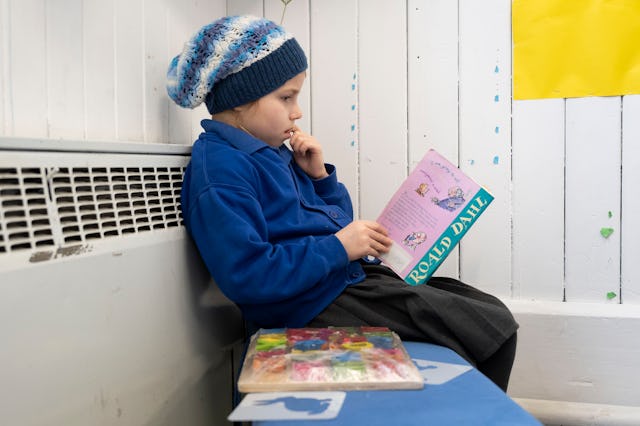The New Roald Dahl Editions Have Hundreds Of Sensitivity Edits — And Readers Are Split
The new editions of classics like "Matilda" have minor edits that make the books more inclusive.

One thing that Gen X, Millennials, and Gen Z all have in common is that we all grew up reading Roald Dahl books. But now, kids might have a slightly different experience when they crack open classics like James and the Giant Peach or Danny Champion of the World.
According to The Telegraph, the newest editions of the children’s classics in the United States and the United Kingdom have hundreds of small but important changes that make the books more inclusive — or as some are saying, more “woke.”
A few examples? The spoiled Augustus Gloop character in Charlie and the Chocolate Factory is no longer described as “fat” but rather as “enormous.” And in the same book, Oompa-Loompas get a makeover: they’re now gender neutral and a bit less problematic.
In The Witches, the titular bad guys are still bald and wear wigs, but new text adds, "There are plenty of other reasons why women might wear wigs and there is certainly nothing wrong with that."
According to the publisher, Puffin Books, sensitivity readers were in charge of the changes, many of which relate to weight, mental health, gender and race. The Roald Dahl Story Company, which owns the rights to the words, said that the changes were made so that the books “can continue to be enjoyed by all today.”
“When publishing new print runs of books written years ago, it’s not unusual to review the language used alongside updating other details, including a book’s cover and page layout,” the company told The Associated Press. “Our guiding principle throughout has been to maintain the storylines, characters, and the irreverence and sharp-edged spirit of the original text.”
And on the copyright page of the new books, there’s a note from Puffin: “The wonderful words of Roald Dahl can transport you to different worlds and introduce you to the most marvellous characters. This book was written many years ago, and so we regularly review the language to ensure that it can continue to be enjoyed by all today.”
Now that the word is out, readers are reacting to the news with strong opinions. Some see why the changes are important to keep the books modern and accessible to all. Some on the right are calling it censorship by “woke bullies,” which is an interesting opinion to have when conservatives are actively trying to ban hundreds of books from schools in their entirety. It seems as if this faction is only upset when they disagree with the edits.
PEN America more rightfully spoke out against the edits, noting that it sets a dangerous precedent for book editing and banning.
“Amidst fierce battles against book bans and strictures on what can be taught and read, selective editing to make works of literature conform to particular sensibilities could represent a dangerous new weapon,” they released in a statement. “Those who might cheer specific edits to Dahl's work should consider how the power to rewrite books might be used in the hands of those who do not share their values and sensibilities.”
Good point.
Author Salman Rushdie, who has dealt with issues of censorship in his books for decades, spoke out on Twitter: “Roald Dahl was no angel but this is absurd censorship. Puffin Books and the Dahl estate should be ashamed.”
Many had opinions landing in the middle — suggesting that the publisher add a note to the beginning of the books that recognize that they were written during a different time.
Or as one person on Twitter put it: “Keep Roald Dahl books as they are but have a little note at the beginning explaining that he was a c—t.”
That seems sensible.
Dahl died in 1994 at the age of 74. And while his books have been incredibly popular around the world for decades, the author himself has been somewhat controversial due to a string of anti-Semitic remarks throughout his life. His family apologized for the remarks in 2020.